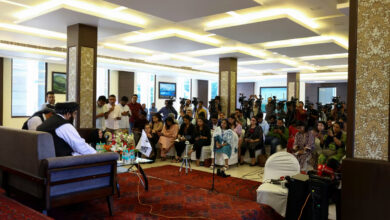As we, the actors and actresses of the Bussy play were on stage for our curtain call, our director stepped ahead to address the audience with a final word. “I am sorry but I want to tell you that what you saw tonight was half of the performance.”
Every summer, the Bussy Project puts together a performance about gender issues built on personal stories and submissions to the group. It started as a reaction to Eve Ensler’s The Vagina Monologues, which was performed at the American University in Cairo in 2005. The play tells stories of 200 women living in the West. In 2006, some AUC students chose to present the stories of women in Egypt instead and continued for four years to do so, each year with a different set of real stories. This summer, the performance took place on Wednesday and Thursday, just outside the Center of Artistic Creativity at the Opera House, a space managed by the Ministry of Culture.
Two hours before the show on Thursday, we were told that the play will be different from the previous night since the Supreme Council of Culture received complaints from journalists and audience members who were offended by the boldness of the content.
“I came for the warm ups, when I saw Sondos [Shabayek, the show director] crying. Then I found her taking the marker and deleting the scenes on the paper that was hung backstage. I asked her what’s wrong. And I found out that those scenes were deleted,” said Seif el-Aswany, an actor whose three scenes had to be taken out of the show altogether.
“I was pissed off at the argument used to ban those scenes rather then me not acting,” el-Aswany explained, adding that the argument they received was that the stories presented were offensive to the country.
Backstage, there was a wave of emotion amongst us. Some were crying for their scenes got canceled. Others were anxiously messaging their friends to speak out their discontent at the situation.
However, we saw it coming.
As she was trying to secure a space for the performance, Shabayek got rejections from el-Sawy Cultural Wheel, the French Cultural Center, the Russian Cultural Center and the Mahmoud Mukhtar Museum’s new theater among other venues. Some were honest to say that the script was not appropriate and half of it would have to be omitted, while some refused to answer calls altogether.
At the first night of the show at the Opera House, where all scenes and stories were performed, mixed responses were witnessed. While some people left in the middle of the show; others stayed on till the end and congratulated the team for their work.
The plan for the second night’s show had to change.
“The only solution for the performance to be done was to omit full stories and scenes which were more than one third of the show,” said Shabayek. “We were thinking of not doing the play that night, but we talked to different people and they said that in order for our voices to be heard we had to present the stories even if some of them are omitted. We needed to make a statement,” she added.
Some intellectuals and public figures attended the show and expressed their solidarity with its case. Actor Khaled Abul Naga addressed us backstage after the show to congratulate us and express his unrest over the censorship. Director Amr Salama and Writer Alaa el-Aswany were also among the audience.
One of the omitted stories was entitled Do You Want to Have Kids and it recounted the experience of sexual molestation within the family. I was supposed to perform it. Its author was unknown to me, but I felt compelled to share it, to convey her emotions and her experience. The end of the story read, “I knew what I was going to do; I was going to leave my grudges somewhere and get on with my life.” The censorship didn’t even leave space for her to portray her sentiments through the play.
Heba el-Affifi wrote and performed another scene entitled I Took off My Veil, which received complaints from audience members during the first night and hence had to be cancelled. El-Affifi talked about her experience of wearing a veil then taking it off, which drew people’s judgments on her. The story was already published in a book by el-Affifi entitled On Behalf of my Body. According to her, it received many positive reviews from girls who said they identified with the story and felt the author spoke on their behalf.
Some stories were omitted but not cancelled altogether. We opted, as actors, to miming them before leaving the stage, as a strategy to showcase the censorship at play.
At the end of the play, one of the actresses, Zeinab Magdy came on stage to say, “I will tell it, I will sing it, I will dance it, I will draw it, I will build it, I will plant it, I will cook it, I will act it, I will let it out.” At this point, we all joined her on stage and said our stories together, which was the play’s finale.
But on Thursday night, Magdy added one act to the list, “I will stifle it”. At this point, we all put our hands on our mouths. The audience’s response was so perceptive that we felt we did in fact “tell it”, despite the censorship.




